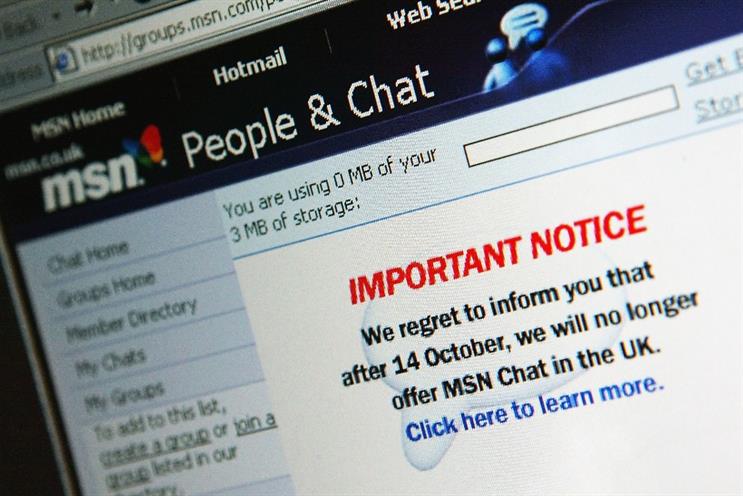As the pace of change has quickened, brands who have previously succeeded have often failed to make their market dominance permanent
I have worked with marketers at AOL, Netscape, Compuserve and LineOne in the past. All brands that grew massively in the dotcom boom but were not immune from the turmoil of the time. As the pace of change has quickened, brands who have previously succeeded have often failed to make their market dominance permanent.
My first digital media plan
My first digital media plan - that I went on to buy - was in 1999 for British Gas, when I worked at EHS. It featured the Express.co.uk, MSN, Excite and Yahoo. Basically all portals as only portals and news had any available inventory at a reasonable price. Cost per mille (CPMs) were between £10 and £30. The plan featured keyword targeted banners, which were really effective, and 200 by 200 pop up ads as well as some good old standard banners. It had a click-through rate of well over 5%. We had no idea what actually happened after that as there was no post-click tracking in place. You couldn't buy enough inventory - it just wasn't there. It was around that time when we took a big step forward online as we started to track post click - and later post impression - activity on plans.
Homepage takeovers on MSN (and Yahoo and AOL) were the must-haves of any large media plan - it’s what marketers demanded
At that time and for years after, Microsoft’s Hotmail was completely unassailable until the launch of Gmail in 2003. Huge reach, great targeting, low CPMs - it was on almost every plan for almost every brand. Homepage takeovers on MSN (and Yahoo and AOL) were the must-haves of any large media plan - it’s what marketers demanded. It was also the only way to get huge reach, and you could see the impact on bottom line sales. They were so in demand that they would sell out way in advance of key periods.
As MSN and others grew in importance, I worked with several advertisers, such as AutoTrader, that would book out key slots for 12 months at a time in deals valued up to $1m. This would include adding search functionality to MSN Motors, AOL Motors and Yahoo Motors. It was very effective and, in fact, that AutoTrader/MSN deal is still running!
AOL was worth more than British Airways
Looking back, it was quite a crazy time. Lycos was the most visited site on the internet. Meanwhile, AOL was worth more than British Airways, yet has struggled to recover since the reverse takeover of Time Warner (described as the worst deal in history) in 2000. Since failing to recover from the transition from a dial up, premium service to a content portal it has retrenched in Europe - closing all offices bar London, and selling the internet access business to Talk Talk.
Excite decided against buying Google for $750,000, which ranks alongside the most stupid business decisions of all time
Excite, which provided search services to leading web browser Netscape, nearly sold to Yahoo in 1999 for $6bn, despite making a $30m annual loss at the time. On the flipside, Excite decided against buying Google for $750,000, which ranks alongside the most stupid business decisions of all time. Instead, it went spectacularly bankrupt in 2001 and the assets were bought out by the founder for $2m.
Yahoo is only worth its stake in Alibaba
It would be too pithy to look back and wonder if a different approach would have worked for many of these brands. But, looking at the facts, Lycos is now the 8726th most visited site, MSN this summer shut down several of its lifestyle channels and Yahoo, although profitable, is only worth its stake in Chinese ecommerce giant Alibaba.
The role of digital in marketing is vastly more rich and full of potential compared to the days when we were kind of forced to start our browsing on a particular website
Portals do, of course, still have something to offer marketers, it’s just that the role of digital in marketing is vastly more rich and full of potential compared to the days when we were kind of forced to start our browsing on a particular website.
No longer indispensible
So, while portals still have a role, and are still used by millions of users - even if only as the access point to their email accounts, they are no longer indispensable on media plans. It’s true that a homepage takeover can still add reach to a media schedule in a brand-safe content environment. But it also comes with a high degree of potential wastage and, increasingly, it is possible to buy them programmatically as part of an audience targeted media buy. The digital planning world has moved on - now it’s programmatic media that lets you craft your communications to millions of users with precisely planned levels of reach and frequency. Better and better controls are available to ensure that you are appearing in visible ad slots and in brand-safe content. And of course, most user journeys now start with a search not a visit to a portal.
As MSN marks 20 years in business, it is amazing to think how much the digital world has moved on. Yet MSN and portals like it played an important part in the growth of the digital industry that we work in today.


